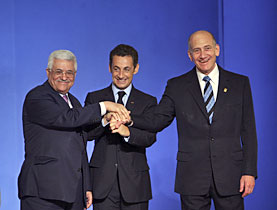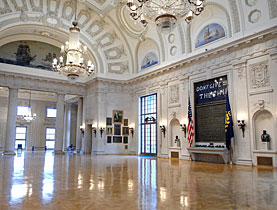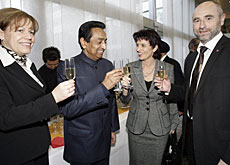Divisions could hamper new cooperation drive

More than 40 countries have joined forces to create the Union for the Mediterranean aimed at forging closer cooperation on environment, transport, immigration and policing.
But deep-rooted divisions among some countries and a lack of political conditions for membership could lessen its impact, says Derek Lutterbeck, deputy director and holder of the Swiss Chair at the Mediterranean Academy of Diplomatic Studies in Malta.
The union’s inaugural meeting in Paris on Sunday set its first priorities, including the creation of a weapon of mass destruction-free zone, plans for a common university, easier travel visas for students, cleaning up the Mediterranean Sea and promoting solar power.
Lutterbeck says the union, the brainchild of French president Nicolas Sarkozy, builds on efforts launched by the Barcelona Process and the Euro Mediterranean partnership.
The academy, a joint project between Switzerland, Malta, Italy and partly the European Union, trains young diplomats from the southern Mediterranean region.
swissinfo: Is this a historic moment for the region?
Derek Lutterbeck: It’s nothing entirely new even though it perhaps gives a new impetus to the endeavours which existed previously.
Most people would say that the Barcelona Process did not achieve its objectives and that therefore something new was necessary.
At the moment there’s a declaration and it’s promising that so many countries attended Sunday’s meeting, which was not at all the case in 2005 when there was the ten year anniversary of the Barcelona Process.
swissinfo: Does the Mediterranean region need such a communal body?
D.L.: There is a need for such a body and a forum of cooperation between the two sides of the Mediterranean because obviously the problems are enormous in the region.
Whether this has to be this Union for the Mediterranean is another question. Now as it stands, the overlap with the Barcelona Process is very strong. The original idea, as I understand it, was to have something in which only the Mediterranean countries would have been present.
That was Sarkozy’s original idea but he had to backtrack and now it has become a kind of revamping of the Barcelona Process.
swissinfo: Will the new Union for the Mediterranean make a difference to the region or will its scale hinder its success?
D.L: The fact that so many countries represented at the highest levels attended seems to signal that there is a broad political will, which could help make a difference. But it is too early to say.
swissinfo: Do you think the union can become a force for change even if it does not have any political conditions for membership and therefore less possibility of influencing policy changes?
D.L.: Even the Barcelona Process did not really achieve any significant political change. One of its implicit objectives was to gradually spread democracy and liberalisation in the southern Mediterranean countries, which hasn’t really happened.
I am not sure the union will be much different in this respect, even though these principles of democracy and human rights are mentioned in the declaration. It seems to me that it is at the level of concrete projects where it can make a difference.
swissinfo: What do you think will be the union’s biggest challenges?
D.L.: Clearly one challenge will be to maintain the momentum which it has started. It has given renewed attention to the Mediterranean region, which was sort of faltering a bit over recent years.
In concrete policy terms there are a number of important issues ranging from energy to migration to climate change, just to name a few challenges which in one way or the other would need to be addressed if the union is to prove relevant.
swissinfo: There are deep divisions among some of the member countries – could these become a stumbling block?
D.L.: The main stumbling block of the Barcelona Process was the Middle East peace process. The deterioration of the situation in the Israeli-Palestinian conflict had a very negative effect and the same will be the case for the Union for the Mediterranean I would guess.
It could also prove to be a stumbling bock for other potential conflicts in the region.
swissinfo: But President Sarkozy says the union has a better chance of success than a previous cooperation process because it will focus on practical projects in parallel to efforts towards peace.
D.L.: If it actually works this could be an added value. One difference is that they would try to work more with the private sector which would sort of provide funding for these projects.
It makes sense to focus on criticism which was often made of the Barcelona Process that it was too bureaucratic, had too rigid structures, and was too complicated.
swissinfo: What is your overall outlook for the union?
D.L.: The main merit of this initiative is to have moved them into centre stage and given renewed attention to the Mediterranean region and its challenges.
But it is too early to see to what extent there will be achievements on the ground, in terms of these projects. If it is to be a union of projects then we will have to see to what extent they will be realised and implemented.
In some areas there is a common interest among most of the countries in the region whereas in other areas this is much less the case. With migration there is only a very limited common interest at the moment.
In other areas this is much more the case, fighting pollution, natural disaster prevention. Cooperation is most likely in those areas.
swissinfo: How will this impact on your work at the Mediterranean Academy of Diplomatic Studies?
D.L.: We see ourselves as part of efforts to bring stability in the Mediterranean by strengthening confidence between the two sides of the Mediterranean.
In the Barcelona Process we considered ourselves part of this endeavour to build confidence and the same goes for the union. These things reflect directly on what we do.
swissinfo-interview: Jessica Dacey
The Barcelona Process, launched by Euro-Mediterranean Foreign Ministers in 1995, formed an alliance based on the principles of joint ownership, dialogue and cooperation.
It brings together the 27 members of the EU and 12 southern Mediterranean states.
The Union for the Mediterranean – brainchild of French President Nicolas Sarkozy – is aimed to bridge the north-south divide between Europe and the poorer states on the sea’s rim to bring peace to the volatile region.
The new union is to include at least 43 nations with a population of about 800 million.
The summit’s final declaration said the union was to be operational by the end of this year and will be jointly run by all its members.
In a final declaration on Sunday, the nations represented at the summit – including Israel, Syria, the Palestinian territories and countries across Europe, the Middle East and North Africa – agreed to “pursue a mutually and effectively verifiable Middle East Zone free of weapons of mass destruction.”


In compliance with the JTI standards
More: SWI swissinfo.ch certified by the Journalism Trust Initiative



You can find an overview of ongoing debates with our journalists here . Please join us!
If you want to start a conversation about a topic raised in this article or want to report factual errors, email us at english@swissinfo.ch.